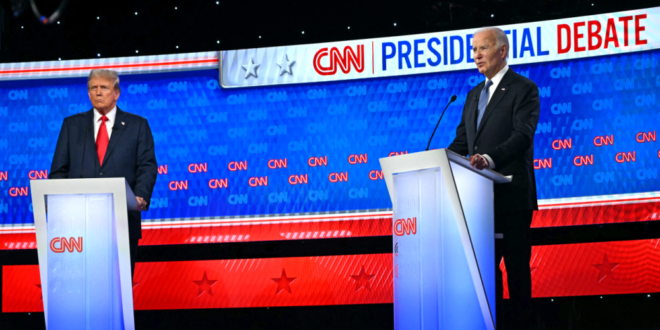President Biden and former President Trump held their first debate in Atlanta on Thursday night with the election on a knife’s edge. Given Biden’s faltering performance, this may also turn out to be the only debate.
Recent polls have the candidates tied 50-50. But 20 per cent of voters were ‘undecided’ and 60 per cent of Americans had planned to watch the debates.
In Europe, where the UK and France hold their own significant elections in July, most slept through this debate. Yet no election matters more for Europe’s security and for international order than the US vote on 5 November.
In this race, the overriding issues driving voters are inflation, abortion, and immigration. Each is significant and divisive. But viewers were also watching with another issue in mind: to judge if the candidates have the temperament and stamina to provide effective leadership.
On this dimension, the debate was very far from reassuring. President Biden’s performance has provoked demands that he cede his nomination to an alternative candidate. This is unfortunate. Many of Biden’s policies have been essential, from bringing NATO together to defend Ukraine, to spearheading America’s COVID-19 recovery.
Former President Trump, meanwhile, was unrepentant and played fast and loose with the facts on everything from 6 January to the trade deficit with China, to Europe’s support for Ukraine.
The debate also confirmed that the contest has expanded from one pitched primarily at working class Americans (and against Washington elites) to one that is now also focused on America’s non-white minorities. Each candidate is vying for Black and Hispanic voters.
President Biden stressed his success in creating jobs and policies targeted to helping build social infrastructure for these communities. President Trump, in one of many attacks on immigrants, the border, and Biden’s policies, blamed immigrants for stealing jobs from Blacks and Hispanics.
Democracy
US democracy fared poorly. The debate was a reminder that civil discourse norms that once provided rules of the road have been swamped by fake facts, disinformation, and few boundaries.
Trump prevaricated on the most fundamental democratic norm, that is support for a peaceful transition of power following an election.
When pressed, the former president said that he would support the results of the 2024 elections ‘if they were a fair, legal, and good’. He refrained from accepting that the 2020 elections met that test.
The two candidates spent much of the debate arguing over their respective policies on inflation, migration, and abortion. But for anyone not steeped in detailed knowledge of the policies, the debate was hard to decipher and littered with misleading and false statements. Not least Trump’s statement that a wave of immigrants were ‘coming in and killing our citizens at a level we’ve never seen’.
The spectacle was alarming at a time when the next US president’s foreign policy choices matter more than ever. With two wars raging in Ukraine and Gaza, a rivalry with China that risks Europe’s economic autonomy and is dividing the world, and a climate crisis that demands US leadership, the stakes are especially high.
America’s place
The candidates hold radically different understandings of international order and America’s optimal role in its preservation.
Both candidates acknowledged the importance of ensuring America’s international standing. The former president turned repeatedly to the US’s botched withdrawal from Afghanistan, calling it the most embarrassing day in US history. He claimed he had been trying to withdraw the US from Afghanistan ‘with dignity’. Biden touted US prestige, highlighting international regard for its military.
Trump returned to many of his standard lines: that a 10 per cent tariff would keep the rest of the world from ‘ripping us off’ and not, as Biden retorted, drive consumer prices up. Little was said on China, other than by the former President who said Beijing was ‘going to own us’ and that Biden is ‘destroying the country’ and was ‘a Manchurian candidate’ who is ‘paid by China’.
The former president also restated his disdain for multilateralism, repeating old tropes, for instance that the US had been taken advantage of by participating in the Paris Climate Accords.
Trump’s comments on Ukraine and Gaza left viewers with little detail. He said that he would end the war in Ukraine before he was inaugurated on 20 January (but didn’t say how). He also repeated his claim that the war would never have happened had he been in charge, and that Afghanistan was the precipitating factor in Russian president Vladimir Putin’s estimation of US weakness.
When asked, Trump rejected Putin’s terms for peace, and repeatedly stressed that the US is protected by an ocean. He returned to his old attack on European governments, saying they should pay more for their own defence. He also stated that under Biden’s leadership the US has spent too much money on Ukraine (using a figure nearly $100 billion too high).
On Gaza, both Trump and Biden tried to outbid each other by demonstrating their support for Israel. Trump said that Israel should ‘finish the job’ but failed to say what would come next and when asked if he would support a state for the Palestinians, he said ‘I’d have to see’. Instead, he blamed Biden for Iran’s support of Hamas and Hezbollah, saying that they didn’t have the money to provide this support when he was in charge.
A sea change
With more than four months to go to election day, this debate may prove to be a flash in the pan. But at the moment it feels more like a more fundamental sea change. The days ahead will be critical ones for the Democrats.
 Geostrategic Media Political Commentary, Analysis, Security, Defense
Geostrategic Media Political Commentary, Analysis, Security, Defense





